Nigerians
Nigerians or the Nigerian people, are citizens of Nigeria or people with ancestry from Nigeria.[23] Nigeria is composed of various ethnic groups and cultures and the term Nigerian refers to a citizenship-based civic nationality.[23] Nigerians derive from over 250 ethnic groups and languages.[24] Though there are multiple ethnic groups in Nigeria, economic factors result in significant mobility of Nigerians of multiple ethnic and religious backgrounds to reside in territories in Nigeria that are outside their ethnic or religious background, resulting in the mixing of the various ethnic and religious groups, especially in Nigeria's cities.[25] The English language is the lingua franca of Nigerians.[26] 50.6% of Nigerians are Muslims and about 47.9% are Christians.[27] Considering the ever increase in the population of the country, it is now believed that the two major religions (Christianity and Islam) will soon be contending for figure supremacy in years to come.
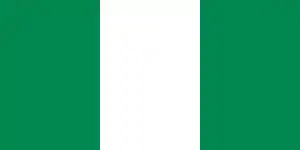 | |
 Nigerian diaspora | |
| Regions with significant populations | |
|---|---|
| 203,452,505 (April 2019 est.)[1] | |
| 6,000,000[2] | |
| 4,000,000[3] | |
| 1,000,000[4] | |
| 1,000,000[5] | |
| 266,000[6] | |
| 200,000 | |
| 106.069[7] | |
| 90,000 - 100,000[8] | |
| 90,000 | |
| 88,000[9] | |
| 60,000[10] | |
| 60,000 | |
| 56,420[11] | |
| 50,000 | |
| 29,000[12] | |
| 24,000+[13] | |
| 51,835[14] | |
| 16,300[15] | |
| 7,025[16] | |
| 4,519[17] | |
| 3,000[18] | |
| 2,000[19] | |
| 1,780[20] | |
| 1,636[16] | |
| 1,425[16] | |
| 3,000[21] | |
| 8,000[22] | |
| Languages | |
| English, regional languages | |
| Religion | |
| Islam, Christianity, traditional religion | |
Ethnicity
Nigerians come from many different ethnic and religious backgrounds as the founding of Nigeria was the outcome of a colonial creation by the British Empire.[26]
History
There have been several major historical states in Nigeria that have influenced Nigerian society via their kings and their legal and taxation systems, and the use of religion to legitimize the power of the king and to unite the people.[28] Northern Nigeria has been culturally influenced by Islamic influence including several major historic Islamic states in the region.[28] The Kanem-Bornu Empire and the Sokoto Caliphate were major historical Islamic states in northern Nigeria.[28] Southern Nigeria historically held several powerful states, including the Benin Empire and Oyo Empire, Ife Confederacy and several other Yoruba states.[28]
Culture
Nigerian culture was profoundly affected by the British colonial rule.[29] Such as British colonial authorities' denouncements and attacks upon polygamy, trial by ordeal, and certain types of sacrifices.[29] At the same time, British colonial authorities maintained and promoted traditional Nigerian culture that strengthened colonial administration.[29] The British spread Christianity throughout southern Nigeria and Christian missionaries assisted British authorities in establishing a Western-style education system in Nigeria that resulted in the teaching of the English language in Nigeria and its subsequent adoption as Nigeria's main language.[29] The British replaced unpaid household labour with wage labour.[29] Prior to colonization in the twentieth century, Nigeria's tribes usually possessed the land as a community, such that land could not be bought or sold.[24] Colonization brought the notion of individuals owning land and commercialization of land began.[24]
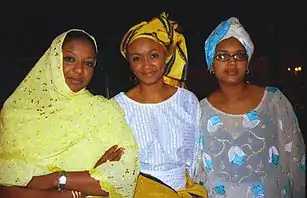 Hausa Fulani Nigerian women, wearing traditional clothing
Hausa Fulani Nigerian women, wearing traditional clothing Nigerians shopping in a mall in Lagos
Nigerians shopping in a mall in Lagos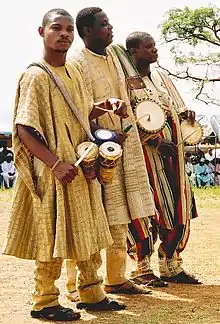 Yoruba Nigerian men of Kwara origin, wearing traditional clothing and playing drums
Yoruba Nigerian men of Kwara origin, wearing traditional clothing and playing drums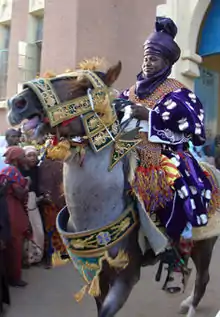 Horseman at the Kano Durbar festival
Horseman at the Kano Durbar festival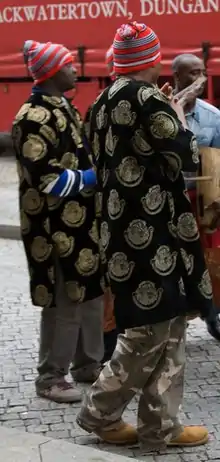 Igbo Nigerian men, wearing the modern Isiagu with traditional Igbo men's hat
Igbo Nigerian men, wearing the modern Isiagu with traditional Igbo men's hat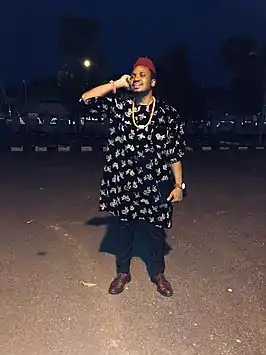 An Igbo man in his cultural attire
An Igbo man in his cultural attire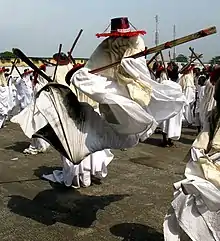 An Eyo Iga Olowe Salaye masquerade jumping
An Eyo Iga Olowe Salaye masquerade jumping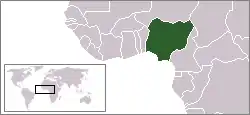 Map of west Africa, showing Nigeria in dark green
Map of west Africa, showing Nigeria in dark green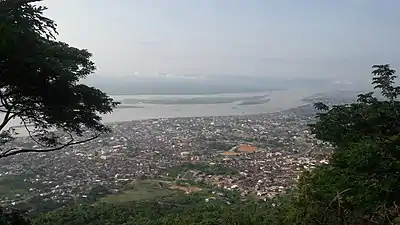 A view of lokoja on top of hill Mount Patti. Kogi state
A view of lokoja on top of hill Mount Patti. Kogi state
In Nigeria, more than seventy percent of Nigerians live in villages of two different types: the first type used by the Igbo and Tiv involves a collection of dispersed compounds, the second type used amongst the Hausa fulani, Yoruba, and Kanuri involves nucleii of compounds.[30] These villages compose members of the ethnicity-related through ancestry as well as strangers who have been assimilated into the ethnicity.[30] Since the time prior to colonization to the present it has been common practice of Nigeria's tribes to adopt strangers into the tribes.[24] A male elder commonly serves as a village chief.[30]
In the large cities of Nigeria, there is substantial intermingling of Nigerians with foreigners, especially Europeans, Lebanese, and Indians.[25] The economic importance of Nigeria's cities has resulted in migrations of people from their traditional ethnic or cultural homeland to cities outside those territories.[25] Igbo, Hausa Fulani and Ibibio people have commonly migrated to Lagos and many southerners migrate to the north to trade or work while a number of northerner seasonal workers and small-scale entrepreneurs go to the south.[25]
Religion
Sectarianism
Ethnic, religious, and regional disputes and tensions have commonly divided Nigerians on political issues.[31] In particular, cultural and political divisions between the Muslim north and the Christian south has politicized religion and caused significant political disputes in Nigeria.[31] Ethnic-motivated and religious-motivated violence by extremists has increased these tensions as well.[26]
However, despite instances of extremism, most Nigerians continue to peacefully coexist, and a common Nigerian identity has been fostered amongst the more-educated and affluent Nigerians as well as with the many Nigerians who leave small homogeneous ethnic communities to seek economic opportunities in the cities where the population is ethnically mixed.[26] Although there are cultural divisions amongst Nigerians, the English language is commonly used as their primary language.[26] Also, most Nigerians share a strong commitment to individual liberties and democracy.[26] Even during periods of military rule, such military governments were pressured to maintain democratic stances by the Nigerian people.[26] Nigeria's political figures commonly know multiple indigenous languages outside their own indigenous language.[26]
References
- "The World Factbook". Retrieved November 17, 2018.
- "EXCLUSIVE: As Benin Republic clocks 53: Over 6m Nigerians live in former Dahomey, 200 in jails but Amb Obisakin says 'Nigeria is a power here, there's no doubt about it'". sunnewsonline.com. Archived from the original on 2013-10-12.
- Mark D. DeLancey, Rebecca Neh Mbuh. Historical Dictionary of the Republic of Cameroon. Scarecrow Press, 2010. p. 283.
- Maguire, Ken (30 May 2010). "Nigerians fight bad reps in Ghana". Retrieved 6 January 2016.
- Dolapo Ajakaiye. Searching Greener Pastures. p. 77. (based on British Home Office report)
- Ulrich Beck, Natan Sznaider, Rainer Winter. Global America?: The Cultural Consequences of Globalization. p. 216.
- "BILANCIO DEMOGRAFICO NAZIONALE" (PDF). Directorate for social statistics and population census Istat – National Institute of Statistics. p. 10.
- Brazil grants Amnesty To 2000 Nigerians
- "Fulani, Nigerian | Joshua Project". www.joshuaproject.net. Retrieved 2020-08-07.
- "Fulani, Nigerian | Joshua Project". www.joshuaproject.net. Retrieved 2020-08-07.
- mevans, Bild: istockphoto com /. "Demographie". Statista.
- "Immigrant and Emigrant Populations by Country of Origin and Destination". migrationpolicy.org. February 10, 2014.
- "Nigerians in South Africa" (PDF). www.migration.org.za. 2017. Retrieved 2020-04-28.
- "Ethnic origin population". www12.statcan.gc.ca. Statistics Canada. Retrieved 18 September 2019.
- McFadyen 2008, p. 55
- "Bevölkerung nach Staatsangehörigkeit und Geburtsland". Statistik Austria. Retrieved 18 March 2015.
- "Australian Government Department of Immigration and Border Protection" (PDF). immi.gov.au. Archived from the original (PDF) on 2013-10-12. Retrieved 2013-10-05.
- "Archived copy". Archived from the original on 2009-02-12. Retrieved 2013-10-05.CS1 maint: archived copy as title (link)
- https://www.migrationpolicy.org/programs/data-hub/charts/immigrant-and-emigrant-populations-country-origin-and-destination
- "Innvandrere og norskfødte med innvandrerforeldre - Tabeller - SSB". Retrieved 18 March 2015.
- https://www.migrationpolicy.org/programs/data-hub/charts/immigrant-and-emigrant-populations-country-origin-and-destination
- https://www.migrationpolicy.org/programs/data-hub/charts/immigrant-and-emigrant-populations-country-origin-and-destination
- Gordon, April A. (2003). Nigeria's diverse peoples: a reference sourcebook. Ethnic diversity within nations. Santa Barbara, California, USA: ABC-CLIO, Inc. p. 233. ISBN 1576076822.
- Toyin Falola. Culture and Customs of Nigeria. Westport, Connecticut, USA: Greenwood Press, 2001. p. 4.
- Toyin Falola. Culture and Customs of Nigeria. Westport, Connecticut, USA: Greenwood Press, 2001. p. 8.
- April A. Gordon. Nigeria's Diverse Peoples: A Reference Sourcebook. Santa Barbara, California, USA: ABC-CLIO, 2003. p. 233.
- "The World Factbook". Central Intelligence Agency. Retrieved 18 July 2019.
- Toyin Falola. Culture and Customs of Nigeria. Westport, Connecticut, USA: Greenwood Press, 2001. pp. 15-16.
- Toyin Falola. Culture and Customs of Nigeria. Westport, Connecticut, USA: Greenwood Press, 2001. p. 18.
- Toyin Falola. Culture and Customs of Nigeria. Westport, Connecticut, USA: Greenwood Press, 2001. p. 6.
- April A. Gordon. Nigeria's Diverse Peoples: A Reference Sourcebook. Santa Barbara, California, USA: ABC-CLIO, 2003. p. 111.
External links
![]() Media related to People of Nigeria at Wikimedia Commons
Media related to People of Nigeria at Wikimedia Commons